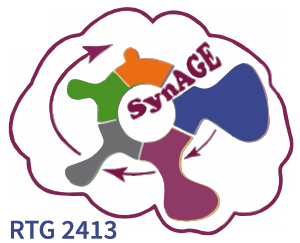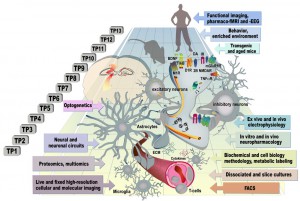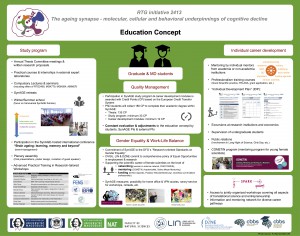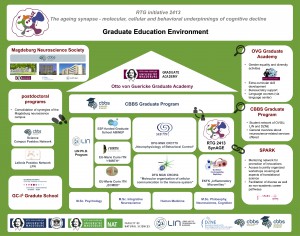 RTG 2413 SynAGE: The Aging Synapse – Molecular, Cellular and Behavioral Underpinnings of Cognitive Decline
RTG 2413 SynAGE: The Aging Synapse – Molecular, Cellular and Behavioral Underpinnings of Cognitive Decline
Our aging society has benefitted in large from advances in modern medicine in the last century. By 2050 the global number of elderly dependent people will supposedly have reached 277 million (Prince et al., 2013) with approximately every fourth Western citizen being over the age of 65 (Cracknell, 2010). This demographic change poses an increasing burden with incurred economic, infrastructural, and last but not least large social expenses – especially if it comes down to decline of cognitive function in the elderly. Thus, there is an urgent need for a better understanding of such cognitive decline in order to develop strategies for maintaining and improving mental health and quality of life in the elderly population. Current research in this field focuses mainly on dementia and associated neurodegenerative diseases. Much less investigated and in many aspects neglected, however, are the consequences of normal aging as such for synaptic, cellular and neuronal network properties. Normal aging is associated with a decline in sensory, motor, and cognitive function, in particular working memory, cognitive flexibility and multi-tasking capacity, and although relatively mild as compared to dementia, this negatively impacts on health and life quality. In fact, there is cumulating evidence that not only genetic factors contribute to the course of aging but also individual lifestyle habits such as rich diet, little to no exercise, stress, provoked development of the metabolic syndrome, vascular alterations, all of which negatively impact on cognitive function in the elderly as well.
The innovative research program RTG2413 SynAGE deals with the idea that cognitive decline in normal aging results from subtle synaptic alterations that impart an imbalance between stability and plastic properties of spine synapses and that is qualitatively different from neurodegeneration. This will further involve changes in the properties and functionality of the extracellular matrix, communication and interaction with glia cells and cells of the immune system, neuromodulation, and ultimately otherwise compensatory mechanisms. We aim to understand these processes of synaptic aging from a molecular, cellular as well as behavioral angle by jointly addressing transversal, intimately linked themes forming a comprehensive framework for inspiring thesis projects with high societal relevance.
We concentrate in SynAGE on synaptic dysbalances involving these four core principles:
- altered synaptic proteostasis (Dieterich Lab, Stork Lab, Kreutz Lab),
- dysfunctions of the immune system (Kreutz Lab, Dunay Lab),
- altered functionality of the multipartite synapse (Dityatev Lab, Schreiber Lab, Gundelfinger Lab, Seidenbecher Lab, Dieterich Lab) and
- changes in neuromodulation (Leßmann Lab, Stork Lab, Düzel Lab, Ullsperger Lab)
SynAGE will address these four transversal themes in a joint effort by a team of molecular/cellular and systems neurobiologists to eventually break ground for innovative intervention strategies. At the same time this forms a comprehensive framework for inspiring thesis projects for 13 PhD and 26 MD students with high societal relevance.
Our qualification program is designed to provide PhD and MD candidates with a cross-disciplinary understanding of nervous system function and aging-related changes in their dynamics at the level of protein synthesis, of synaptic signals, and the neural network. Our students receive state-of-the-art training in a fascinating area of neuroscience that currently has a high demand of well-trained young researchers given the demographic changes of our society.
We employ cutting-edge technologies and emergent techniques, promote international visibility at an early stage and chances for intensive networking to promote career track development in- and outside of academia. Enhancing the career perspectives and employability of researchers and contribution to their skills development is a core principle of our structured and individualized supervision and training PhD program. Collaborations within the CBBS (Center for Behavioral Brain Sciences) and the local GC-I3 (Health Campus: Immunology, Infectiology and Inflammation) and CDS (Dynamic Systems and Biosystems Engineering) as well as with international groups offer a competitive and instructive environment.
Funding for 13 PhD positions and 26 MD fellowships is granted by the DFG within SynAGE. The intended duration of an individual PhD position will be 36 months and 12 months for individual MD fellowships. A thesis committee guides each RTG student and discusses the scientific content and future steps as well as individual career options. Our mentoring program includes essential components of scientific career planning such as project and time management, group leading competence, grant writing and others with mentors from academia and non-academia (pharmaceutical industry, publishing, funding agencies, etc.). Moreover, SPARK, a mentoring network aimed to accelerate the translation of university-based inventions into clinical relevant drugs and diagnostics round up our career development curriculum and increase our student’s network of professionals. In jointly organized workshops dedicated to all aspects of translational science, such as entrepreneurship, academic research, politics, societal implementations, SynAGE and SPARK will work towards an enablement of our students for diverse career pathways. To identify individual needs and, hence, implement measures accordingly, the students will assess themselves with the help of ‘Individual Development Plan’ (IDP) forms each year. These IDP forms shall be shared with the supervisor ahead of the annual thesis committee meetings and used to clarify approaches to the student/mentor relationship.
Regular progress reports in lab meetings and the exchange with lab members provide additional input. Participation in project-specific workshops, summer/winter schools and an international conference round up the qualification program.
Our RTG2413 is embedded in the Otto von Guericke Graduate Academy (OVG-GA) and the CBBS graduate Program, both ensuring high quality standards for education of graduate students serving as central service unit for all doctoral students of the entire OvGU.


